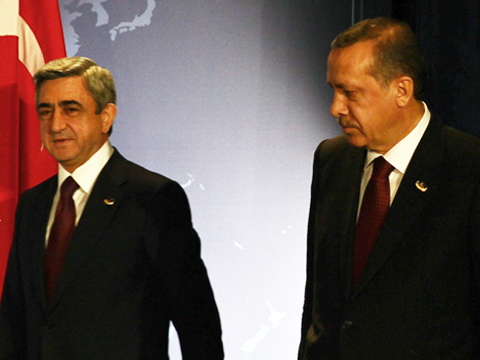Turkey's righteous calls versus Armenia's baseless claims

By Mushvig Mehdiyev
Despite Turkey's persistent calls to investigate into the core of what happened hundred years ago and dispel unfounded allegations that the Turks committed a violent genocide against Armenians, several world leaders visited Yerevan on April 24 to join the unproven "Armenian genocide" commemorations.
Ankara, which voiced its respect to all the victims of the tragic events that happened under the Ottoman Empire's rule in the beginning of the 20th century, called on the international community to avoid any move that could hurt relations between nations.
People gathered in front of the Genocide Museum in Armenia showed a crestfallen stand in honor of the memories of the so-called "Armenian genocide" victims. Such a show of sympathy for the unproven tragedy was regarded as a discrimination against other nations.
Turkish Prime Minister Ahmet Davutoglu believes that calling the 1915 events "genocide" is discrimination in view of the same fate the Turkish and Muslim Ottomans suffered.
Davutoglu reiterated his government's firm ground that the "sad" losses Armenians suffered in 1915 were no more tragic than those suffered by other nations and ethnic groups at the time.
"It is a form of "discrimination" to focus on Armenians and not on “those Turkish and Muslim Ottomans”, who died in the same time period," he said.
Turkey, the successor state of the Ottoman Empire, strongly rejects the term "genocide" to describe what happened to its Armenian population during the World War I. Ankara claims that "specialists could investigate into the common history of the Turks and Armenians based on impartial scientific facts".
Turkish President Recep Tayyip Erdogan claimed in his recent address that his nation's ancestors never committed a "genocide" in history. He emerged confident saying "we are ready to open our military archives, and we have no fear, no worries on this subject since our ancestors did not persecute."
"The Armenian's claims in regards to 1915 events, especially in terms of the numbers it put forward, are all baseless and groundless," Erdogan said.
The UK and the United States, two of Turkey's most prominent allies have also refused to use the term "genocide" in reference to the killings which took place in 1915.
The U.S. leadership remained true to its previous approach towards the so-called genocide avoiding to use the word "genocide" in official addresses from the White House.
President Barack Obama's speech lacked the "key word" when he promised to stand in solidarity with Armenians.
"On this solemn centennial, we stand with the Armenian people in remembering that which was lost. We pledge that those who suffered will not be forgotten," Obama expressed his stance.
Treasury Secretary, Jacob Lew led a delegation to Armenia on April 24 accompanied by the U.S. ambassador to Armenia, Richard Mills, and four lawmakers, according to a statement from the White House.
British Prime Minister, David Cameron also refused Yerevan's invitation. He made clear he will not visit Armenia in person on April 24 despite understanding the "significance" of the events, said the UK Ambassador to Yerevan, Katherine Leach.
Meanwhile, on April 24 Turkey celebrated the 100th anniversary of the historical victory of the Battle of Gallipoli. The solemn celebrative event has been attended by numerous high-level representatives from around the world.
Denying to realize the true essence of what has happened 100 years ago Yerevan still shows an aggressive stance on the matter in an effort to label its tragedy under the name of "genocide". Armenia has been unwilling to normalize its relations with Turkey.
Turkey has called on Armenia to give up its efforts against Ankara by using a tragedy as a political pressure point to seek some form of world victimhood recognition. Turkey has already warned that Yerevan policies would only enflame hatred and tensions in between the two neighbors.
- - -
Follow Mushvig Mehdiyev on Twitter: @Mushviggo
Follow us on Twitter: @Azernews
Here we are to serve you with news right now. It does not cost much, but worth your attention.
Choose to support open, independent, quality journalism and subscribe on a monthly basis.
By subscribing to our online newspaper, you can have full digital access to all news, analysis, and much more.
You can also follow AzerNEWS on Twitter @AzerNewsAz or Facebook @AzerNewsNewspaper
Thank you!
